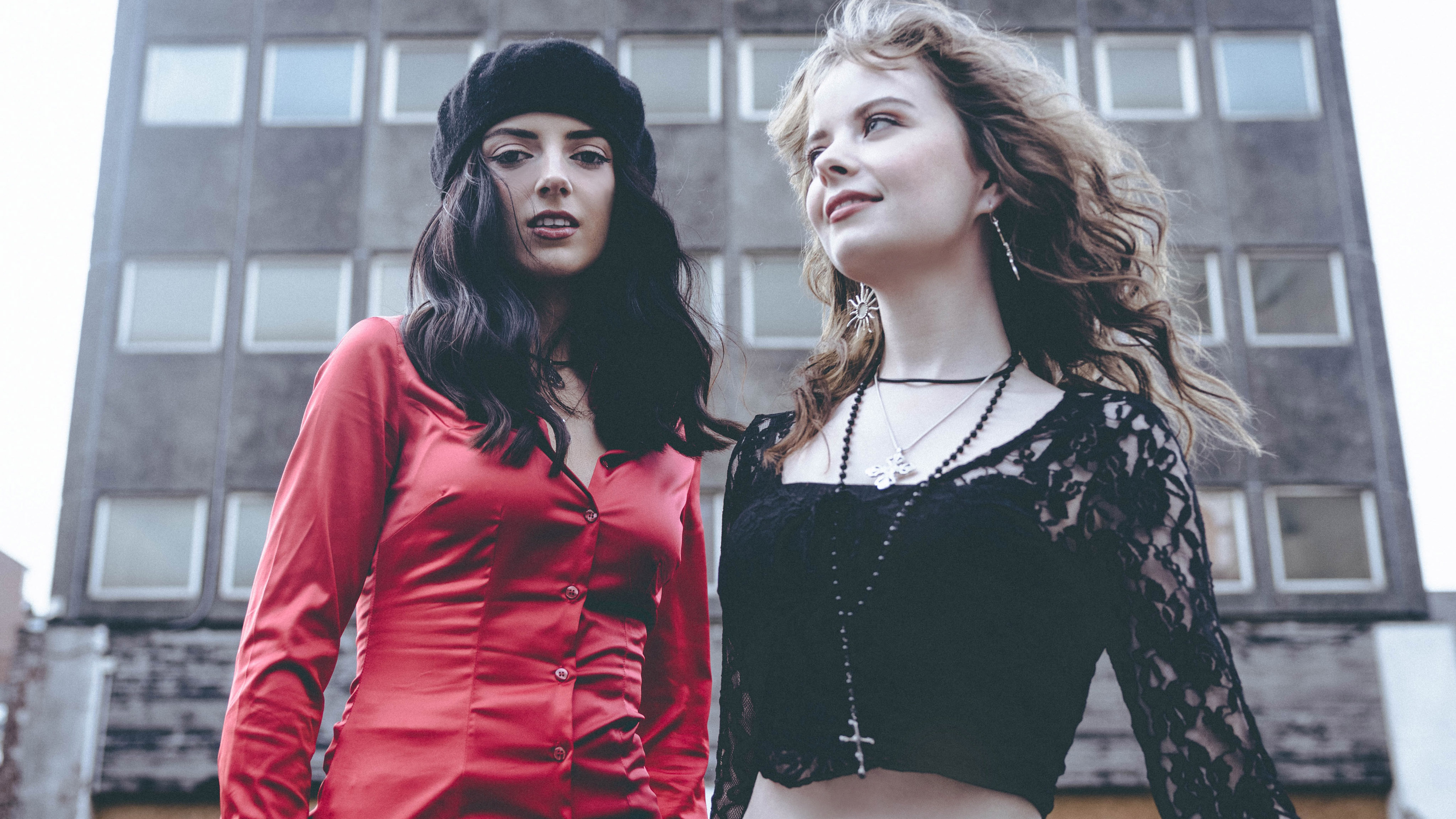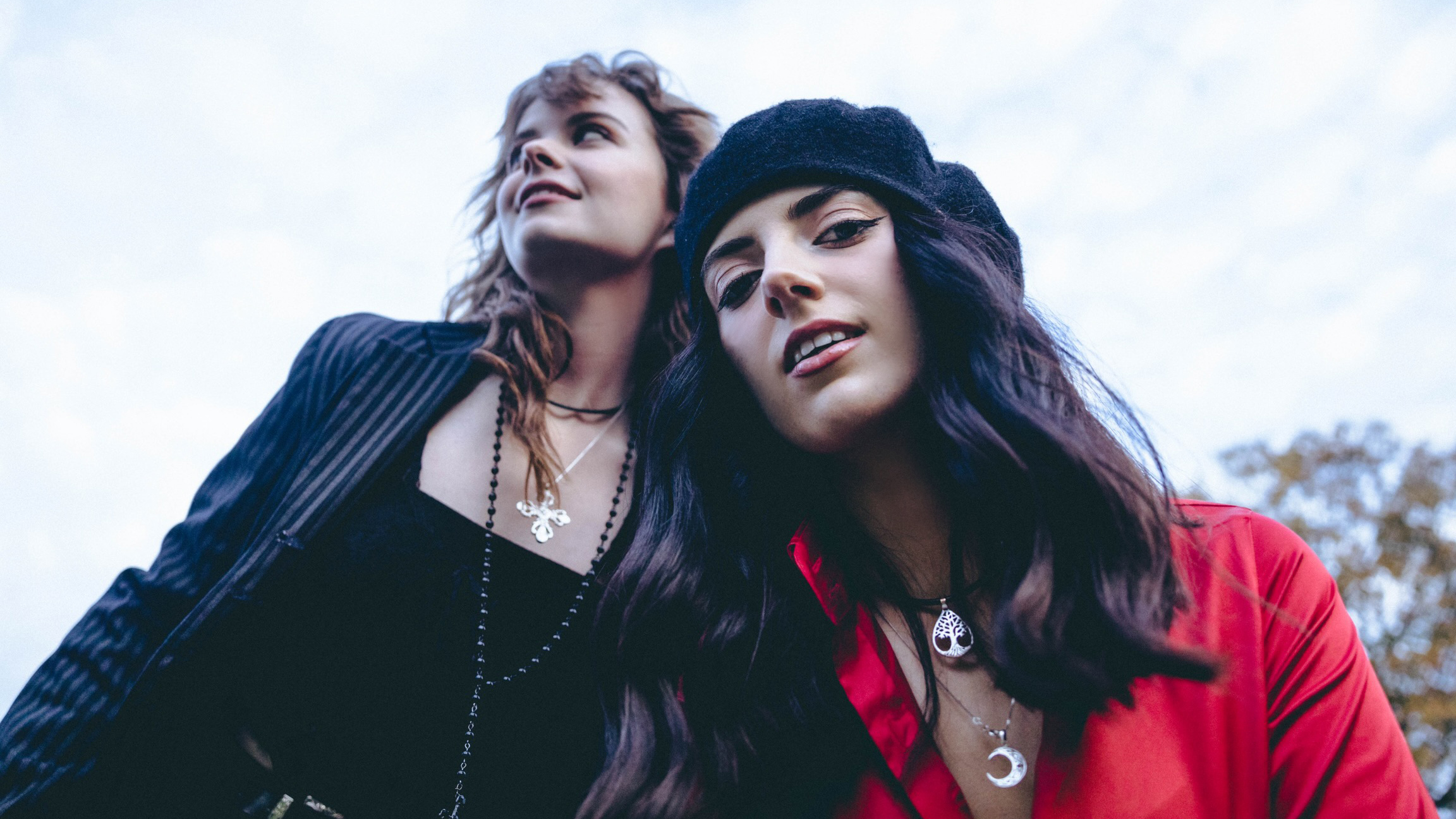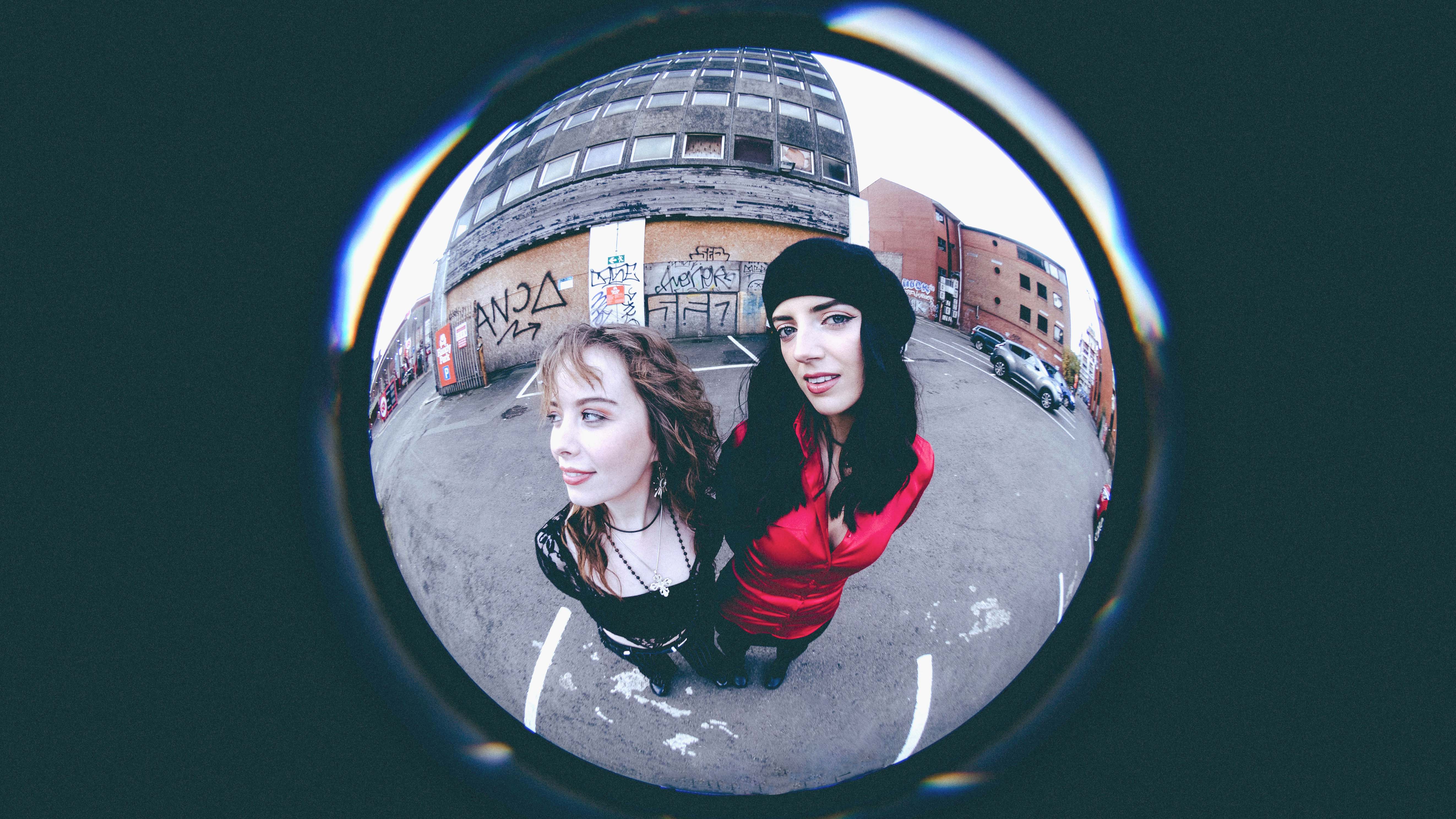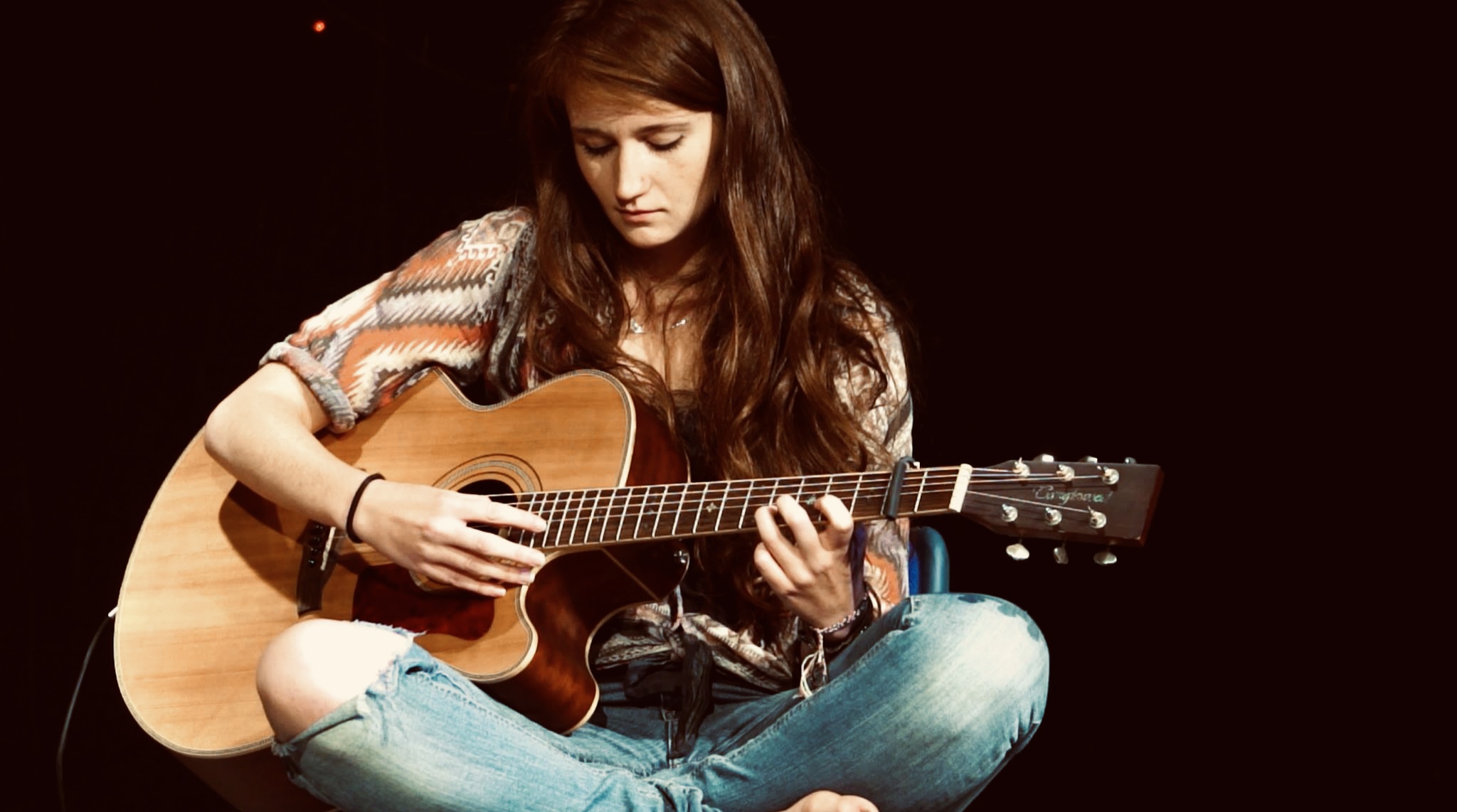Dea Matrona: meet the young Belfast band keeping the fire of Rory Gallagher and Fleetwood Mac burning bright
We talk to Orlaith Forsythe about how she honed her guitar and bass chops with 12-hour days busking

Want all the hottest music and gear news, reviews, deals, features and more, direct to your inbox? Sign up here.
You are now subscribed
Your newsletter sign-up was successful
With a band name plucked from Celtic mythology that translates as "divine mother goddess", Belfast’s Dea Matrona are an almighty modern power duo to keep an eye – and ear – out for in 2023.
Consisting of hyper-talented young guitarists-come-bassists-come-vocalists Orlaith Forsythe and Mollie McGinn, Dea Matrona fuse unruly retro-inspired riffs and Beatles-esque harmonies with a contemporary rock n’ roll aesthetic and an undeniably badass female energy.
Having bonded over a mutual love of classic rock and while still at school, Orlaith and Mollie simultaneously made a name for themselves locally – by busking on the streets of Belfast – and globally - by posting their videos online, where they’ve since amassed a YouTube following of 57,000 subscribers and racked up well over eight million views.
The pair, still barely into their twenties, cut their teeth learning and performing monster tunes from the classic rock and blues canon like Led Zeppelin’s Whole Lotta Love, Fleetwood Mac’s Oh Well and a mean, slide guitar-stuffed version of Rory Gallagher’s Cradle Rock. Since then, they’ve garnered ever-increasing levels of kudos as songwriters in their own right, thanks to their catchy, guitar-loaded singles like Stamp On It, Glory Glory (I Am Free), and their latest offering, Red Button.
“It certainly is inspiring to be able to show your influences to new people,” says Orlaith, as she reflects on the band’s knack for bringing old school sounds to a new school audience.
“I love playing shows, especially support shows where the audience doesn’t know what to expect and you don’t know what to expect either. The audience plays a really big part because you have to win them over.”
When you support different artists, you pick up something different from all of them
As for whose audiences they have been winning over, the duo have supported artists as diverse as Eagles of Death Metal, Feeder, Van Morrison and Black Eyed Peas. Quizzed on whether she suspects they’re the only band in history to have opened for both “Van The Man” and Will.i.am, the guitarist laughs and says that “We’ll have to Google search that!” A cursory post-interview browse seems to confirm this to be the case, and scoring such wide-ranging placements is no doubt testament to Dea Matrona’s natural ability to cross boundaries of both genre and generation.
Want all the hottest music and gear news, reviews, deals, features and more, direct to your inbox? Sign up here.
“When you support different artists, you pick up something different from all of them,” says Orlaith. “To go across the board genre-wise is quite important.”
Such astute pearls of wisdom abound in our conversation with the young player who's already experienced everything from getting robbed as a busker, to going viral online and crying tears of joy-slash-disbelief at a recently sold out hometown show. Speaking from her home in Northern Ireland, we caught up with Orlaith to hear more about her whirlwind guitar journey so far…
We would learn different guitar parts and jam together at the weekend on whatever we were learning
Tell us a little about how you first got into playing guitar?
"I started playing guitar through traditional Irish music – just acoustic guitar and a bit in DADGAD tuning as well. Then, when I was about 16, I became friends with Mollie and we both started getting into heavier music and listening to Led Zeppelin and Fleetwood Mac. Of course, when you listen to Led Zeppelin, you want to learn harder rock stuff."
Were you blessed with parents who had a great record collection or did you seek out classic rock music yourself?
"My Dad was really into traditional Irish music and my Mum did love stuff from the ‘80s – she’s a big Duran Duran fan! So, I really did seek it out myself. Mollie, to an extent as well, was the same. We just bonded over this music that no one else in our class was listening to.
"We would learn different guitar parts and jam together at the weekend on whatever we were learning. It was a fun way to learn - putting the pieces together with no real set of instructions."
Would you say that learning the classics was your education in songwriting as well as playing?
"Definitely, yeah! We just wanted to learn as much as we could and that was the best way to get started. I would learn anything I was listening to and it really helped us along the way for going busking and doing gigs, and then certainly later down the line when we started writing our own material. It really did help to shape our sound."
Do you recall what some of the first classic rock riffs you learned to play were?
"I think the first one might have been Oh Well by Fleetwood Mac, and then Dearg Doom by Horslips. Then it was probably Whole Lotta Love. I think Oh Well might have been the definitive first one. I was drawn to it because it was what I was listening to the most at the time, and I just remember picking it up.
"It’s funny because it came full circle when we did a live video of that song out busking in the street and it got a million views, so it’s pretty cool that that was also the first thing I learnt on guitar."
I have a Les Paul and dabbled with a few others – but the Strat just really works for what we want to do
Did your gig rig evolve much as you made the journey from street to stage?
"When we were busking we literally put everything through one amp. It was two microphones, bass, guitar, two pedalboards all running into a battery powered amp, with a splitter pedal. It was strange but it really worked. Certainly now, we don’t have that same set-up! We have amps and our pedalboards and in-ear monitors and everything, so it’s very, very different.
"When we started, we didn’t realise that you could use a car battery to power your amp, so we’d do two or three hours before you’d hear the volume of the amp decrease as the battery was running out – especially with everything we had going into it. So, we’d go and buy batteries and it was costly! But in the last two years of busking, we got a golf buggy battery to power the amp. You’d just charge it overnight, go busking and it’d power the amp all day."
Nowadays, what are your gear essentials?
"I have a Fender Strat. Can’t go anywhere without it! I just love the versatility of it. I’ve played a few different guitars – I have a Les Paul and dabbled with a few others – but the Strat just really works for what we want to do.
"I love the drive it gives you with the single coils. My one actually has a humbucker in it as well, so you get the best of both worlds. It just feels right. It’s just my instrument."
What’s your non-battery powered amp of choice?
We use Victory amps. We were very fortunate - they gave us some to try out and we really liked them. They’re really, really cool boutique amps that give us that big, classic rock, raw guitar sound that we really like.
You mentioned that you had a pedalboard even for busking, so do you like to do a lot of experimentation in the effects department?
"Well, it might be a stretch to call it a pedalboard! I think it was just a few pedals on the ground, but now we do have our ‘boards. Mollie and I switch between guitar and bass. So, we have two pedalboards between us.
"We use an Electro-Harmonix Big Muff on bass – it rocks! It’s my favourite pedal ever. It gives us that big, big sound. I used a Boss distortion for a while but I had to tweak the EQ here and there, but when I plugged in the Big Muff on the bass, it just worked. I use a Big Muff for guitar as well. Then, I have a Holy Grail reverb. I do have a wah, but I haven’t really used it in a while.
"I really want to use a wah on the bass. Wah’s not used on the bass often enough! That wah wah bass on Dancing In The Moonlight by Thin Lizzy needs to be a thing more! Dea Matrona has to do a wah wah bass song. It has to be the next thing."
What other ideas or techniques do you have for putting contemporary twists on the classic rock sounds you love so much?
"It’s still a work in progress, but I think we like to take the live raw energy that comes from big guitar and bass sounds and put our own spin on that with our songwriting. Particularly when we did Stamp On It a few years ago, that was the coming together of our influences and our songwriting in one. It’s a good example of how our music has evolved to have the best of both worlds.
"It’s important to us that we have guitars in our songs. We’re proud to be a guitar band, and it’s a really important aspect of what we do. We want our live set to be really energetic with really rockin’ sounds!"
Live, you have quite a straightforward line-up up of guitar, bass and a touring drummer. Is that a deliberate nod to the power trios that thrived in the ‘60s and ‘70s?
"We never really thought about that until it had happened and we realised it was a bit like Cream or The Jimi Hendrix Experience – in terms of set-up, not in terms of sound – with the three of us playing bass, drums and guitar. It just works. It also means that there’s nowhere to hide. You have to do your part. There’s only three people on stage so you have to step up and it keeps you on your toes.
When we used to busk, the bass – eventually – would just start to get really heavy so we’d switch. Now, it’s just what we do!
You mentioned that the guitar and bass roles are quite interchangeable between you and Mollie and you swap instruments a lot live on stage. How did that come about?
"I try to think about what the reason is and I honestly think it probably comes from busking. When we used to busk, the bass – eventually – would just start to get really heavy so we’d switch. Now, it’s just what we do!
"It gives us an opportunity to shake it up during our set. You can have your go on the bass for a few songs and then go back to the guitar. It’s fun and it keeps the set fresh. I love the reaction when we play to a new audience in a support slot, and they don’t expect to see the guitars being changed. A lot of people think we’re about to walk off when we take our instruments off, even if we’re only two songs in!"
Some of the best guitar players are those who have spent time playing bass, and vice versa. Having an understanding of both instruments and the way they function within a band can only be an advantage…
"Definitely. Some of my favourite guitarists, like Lindsey Buckingham, started on the bass when he used to play in a band with Stevie Nicks before Fleetwood Mac. I think it gives you a cool understanding of the low end and what you could do on the bass while the guitar does something else. It’s just cool to have a good understanding of multiple instruments."

What’s the Dea Matrona songwriting process usually like?
"It’s very collaborative. Mollie and I write all the songs together and I really like that because it means we both have to think of something and bring it together. It’s really nice if one of us has an idea and brings it to the other, that it has a whole fresh set of ears. I really like the collaboration involved with writing with someone else.
"I like the last song we put out, Red Button. I think it was our most Dea Matrona sounding song yet - guitars, with a good measure of harmony and something catchy in it."
Are you working on a debut LP yet, and if so, how much can you tell us about it at this stage?
"It’s definitely on the horizon! At the minute, we’re enjoying the ‘putting out singles’ approach. It’s nice to put a song out, see the reaction and keep building upon those singles. We are really wanting to put together a debut album.
"It’s important to us as a band to have a physical album and it’s going to be really exciting when we eventually do that. We’re enjoying making new songs and still finding our sound. We still are quite early on, so it’s just cool to put out new songs and see how they go down."
Are live shows also a testing ground for new material?
"Totally! I think that last single, Red Button, might be the first song that we hadn’t ever played before we put it out. Every other single we’ve done - maybe bar Glory Glory (I Am Free) and Red Button - we’d played first.
"I know, for So Damn Dangerous, we played it on our Irish tour in March and every night someone would come up and say ‘That dangerous song is really cool!’ so we knew that we had to release it."
What are some of your favourite covers to play live and why?
"I really like doing Cradle Rock by Rory Gallagher. That’s fun because we like to pay tribute to one of our heroes and he’s also an Irish hero, so to get to show our musical heritage as a part of our set is really cool.
"Any chance we get to play Led Zeppelin is always fun because that was the big influence for us, so it’s cool coming back to that. I think, when we do our tour in January, I’d like to change it up and pick random covers."

It’s common to see people doing pop or acoustic covers of classic rock songs, but do you think you could go the other way and give some pop tunes the classic rock treatment?
"I would love to do that! I love watching Radio One Live Lounge, and when people do things like that, I think it’s so cool. You hear a song so differently when it’s done right, when people take a song and flip it on its head.
"Running Up That Hill by Kate Bush has been done in so many different ways and it’s just so good every time. It's a real testament to how good a song is if it can be done well as a cover.
What has been your most stand-out on-stage moment to date?
"We toured Europe for three weeks playing a support slot, and then came home and played our own show in Belfast, and it had maybe 800 people there. It was just amazing. I cried on stage maybe three times. I couldn’t understand that they had all come to see us after doing a support slot for three weeks, so that was a really nice way to wrap up that tour."
Dea Matrona will be hitting the road with The Kris Barras Band for a UK tour in January and February 2023. Tickets are available here and find out more about the band at deamatrona.co.uk
Ellie started dabbling with guitars around the age of seven, then started writing about them roughly two decades later. She has a particular fascination with alternate tunings, is forever hunting for the perfect slide for the smaller-handed guitarist, and derives a sadistic pleasure from bothering her drummer mates with a preference for “f**king wonky” time signatures.
As well as freelancing for MusicRadar, Total Guitar and GuitarWorld.com, she’s an events marketing pro and one of the Directors of a community-owned venue in Bath, UK.
